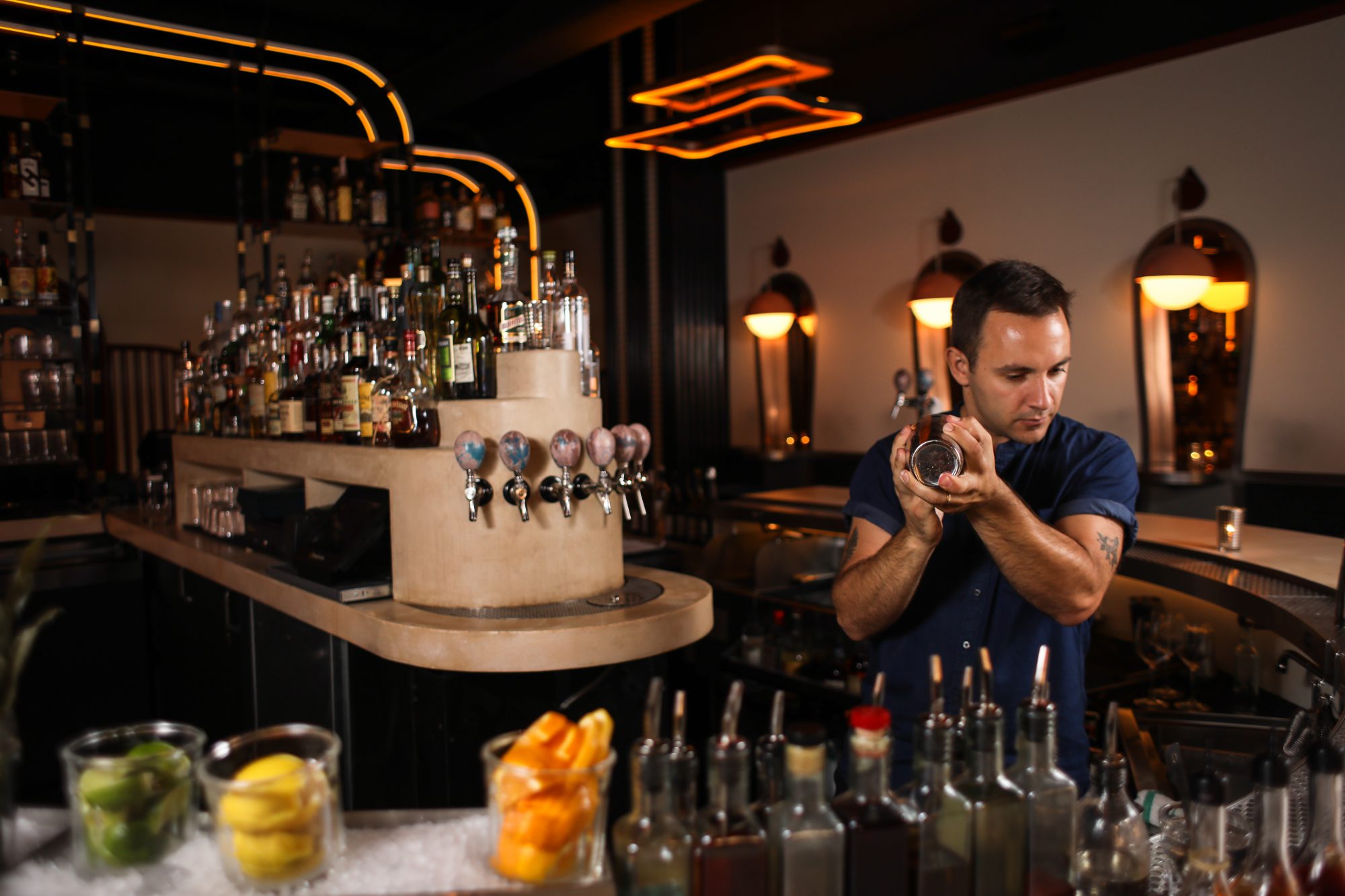
Daniel Zacharczuk at Bibo Ergo Sum | Photo: Eugene Lee
Veteran bartender Daniel Zacharczuk is only in his 30s, but his passion for hospitality, encyclopedic knowledge of cocktails, and soft-spoken, engaging personality feel like throwbacks to an older generation. Rather than building followers on social media, Zacharczuk has been quietly helping to open some of the best bars in Los Angeles over the last decade.
Zacharczuk is currently the General Manager at Bibo Ergo Sum, one of my favorite L.A. bars to open in the last few years. Bibo recently celebrated its one-year anniversary and launched a new cocktail menu, Bibo Through the Ages.
After sitting in front of Zacharczuk at so many L.A. bars, I finally got to chat with him at a holiday pop-up at The NoMad Hotel in Downtown L.A. Appropriately enough, the guest bartender was Julian Cox, and numerous friends from the extended L.A. bar fam stopped by throughout the night.
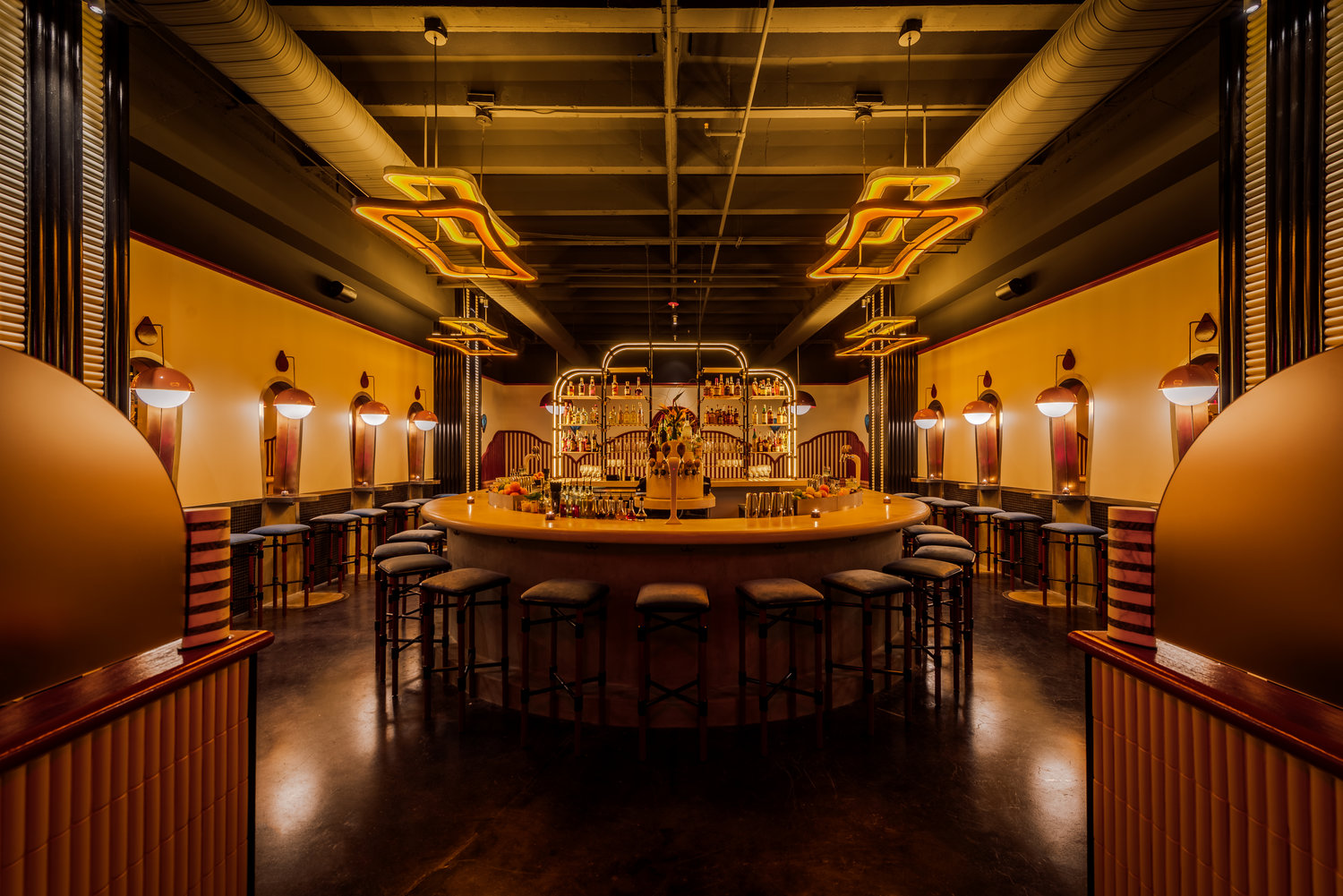
Photo: Bibo Ergo Sum
Zacharczuk explained the thought process behind Bibo Through the Ages, which is divided into three sections: Old Style, Neon, and Present & Beyond. “Sort of an underlying idea behind the ethos of Bibo Ergo Sum – ‘I drink, therefore I am’ – is that you can take it anywhere. There was this daydreaming idea: What if we opened several Bibo Ergo Sums, what would that look like? Well, it could be a coffee shop, a wine store, a brewery. Anything and everything that has to do with imbibing, whether it’s alcoholic or not, there’s an approach to it, there’s a mindset to it, and we identify with those things.”
“So what if we take that approach to a cocktail menu and apply it to different eras throughout time. What if we took the Old Style – no need to fluff it up beyond Old Style, it is what it is – and we take a delicious example of a shrub, a clarified milk punch, a mead (fermented honey), or even just an Old Fashioned. How do we reintroduce those [drinks] with ingredients that are just as compelling as the drink is itself?”
“Neon‘s been around for decades! It wasn’t invented in the ’60s, it was well before that. Neon’s fun. It’s approachable. It gives you a sense of wonder, in a way. I feel like it makes you move – if you see neon from across the street, you gravitate towards it. Or you’re looking at something as you’re walking away from it. Either way, you’re moving. We applied that to the texture of some of the drinks as well – it kind of dances on your palate. It keeps you from staying still, for lack of a better expression.”
“The third section, Present & Beyond – what Bibo is doing now, and what would Bibo look like beyond. What would it look like later?” For Zacharczuk, a lot of the drink development began with the basic understanding that some of these drinks will never go away. “There will always be a Daiquiri, there will always be a Manhattan, there will always be a Martini. So how do you reimagine some of those things?”
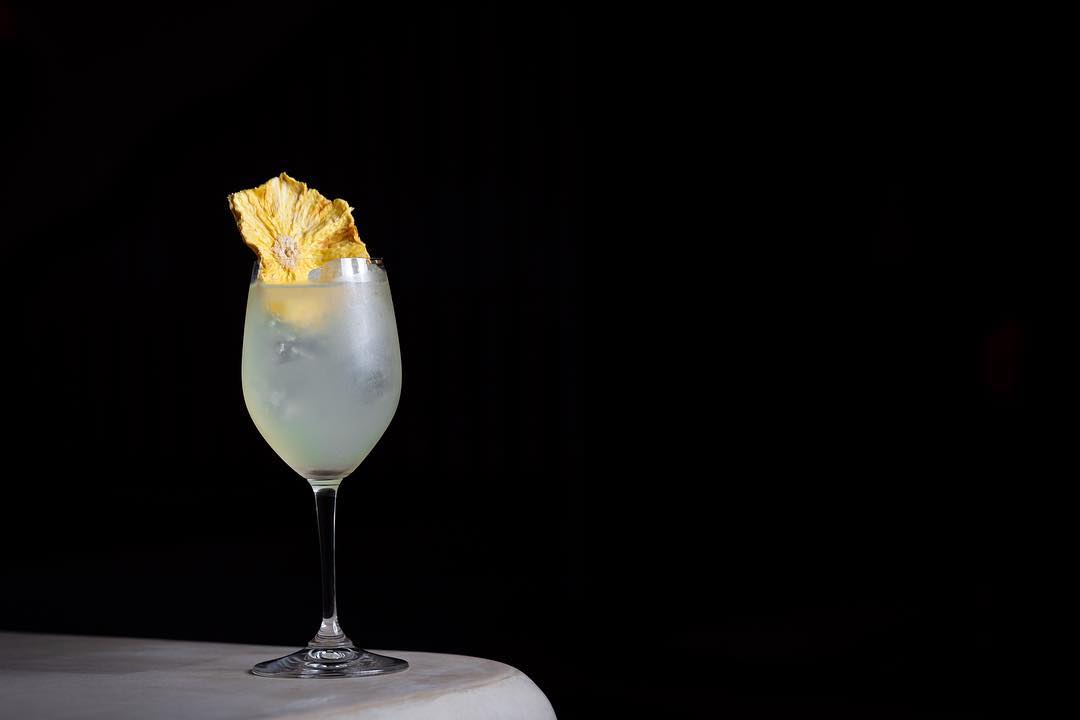
Carte Blanche: coconut-washed Damoiseau Rhum, Agricole Blanc Vermouth, Giffard Caribbean Pineapple, clarified lime juice, Amburana Nutmeg Hogo | Instagram: @biboergosumla
One of the standouts from Present & Beyond had its roots in Bibo Hour, which was launched not long after the bar opened and features a brand or “someone that had a product that we identified with that got us excited, and we’d create a menu that featured that product.” One session featured a “super delicious” rum from House Spirits, Casa Magdalena. “What if we made a clarified Daiquiri but made it invisible? Clarified Daiquiri, ok I get it. That’s cool. Invisible Daiquiri, what is that? What are you saying? Is it even a drink? Is it just a glass? Then the idea became, what if it tasted like an aged rum Daiquiri, but it was still clear? Great! That sounds compelling.”
Also from Present & Beyond, the Manhattan Grove: Rittenhouse 100, Lillet Blanc, Garden Curacao, Verjus, Peychaud’s & Orange Bitters, absinthe. “There are so many Manhattan variations that are based on different neighborhoods and boroughs in Manhattan, I don’t want to call [one] a Manhattan No. 4 or whatever. But what would it taste like if you were in any park in Manhattan, and you had a drink that reflected that park? I feel like that part of the world has amazing, dense civil parks. It leaves an impact. What would an herbaceous, light, quaffable Manhattan taste like?”
Zacharczuk explains, “Those different approaches reinvigorated a sense of excitement to develop a menu that brought us back in the same mindset of when we launched The Prestige menu, which was to me incredibly unique, a lot of fun, and warmly received. And it seems to be we’re getting the same reception for this new menu.”
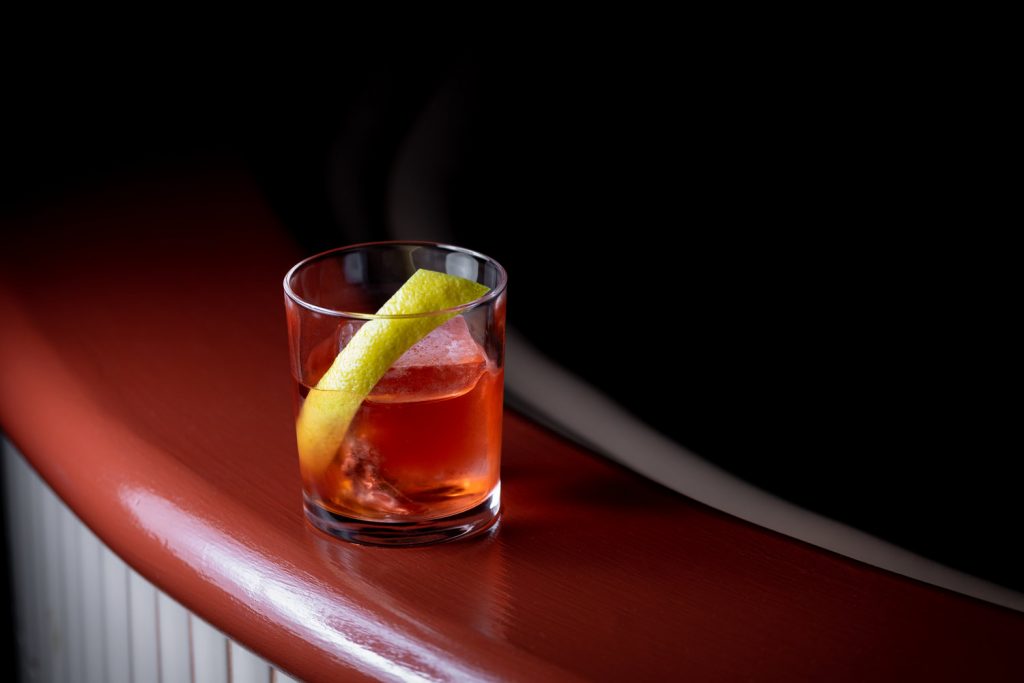
The breakout hit is the Old Fashioned style Nite Lite from the Old Style section. “Bourbon based, with Wild Turkey 101, teaspoons of apricot liqueur, Frangelico, and Amaro Sfumato. Think of an Old Fashioned that’s simultaneously fruity, bitter and smoky, and it doesn’t end up being too sweet because you have a 100-plus proof, fairly dry whiskey in Wild Turkey. It’s been our number one seller so far.”
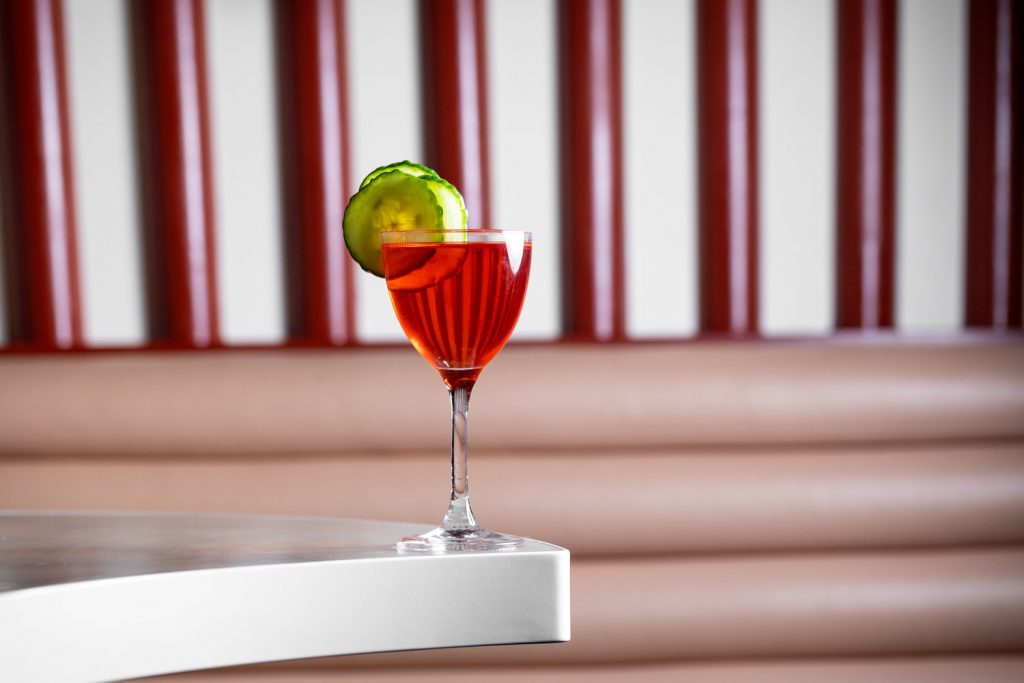
From the Neon section, the Pismo Club is a play on words between a Pimm’s Cup and a Cosmopolitan. “Incredibly refreshing, very beautiful ruby red color. We blend our own fruit cup or Pimm’s mix, a little bit of cranberry liqueur, naturally a vodka base (we feature Absolut Elyx), a little dry vermouth to lengthen everything, citrus cordial. Stirred and served up, garnished with contrasting color cucumber.”
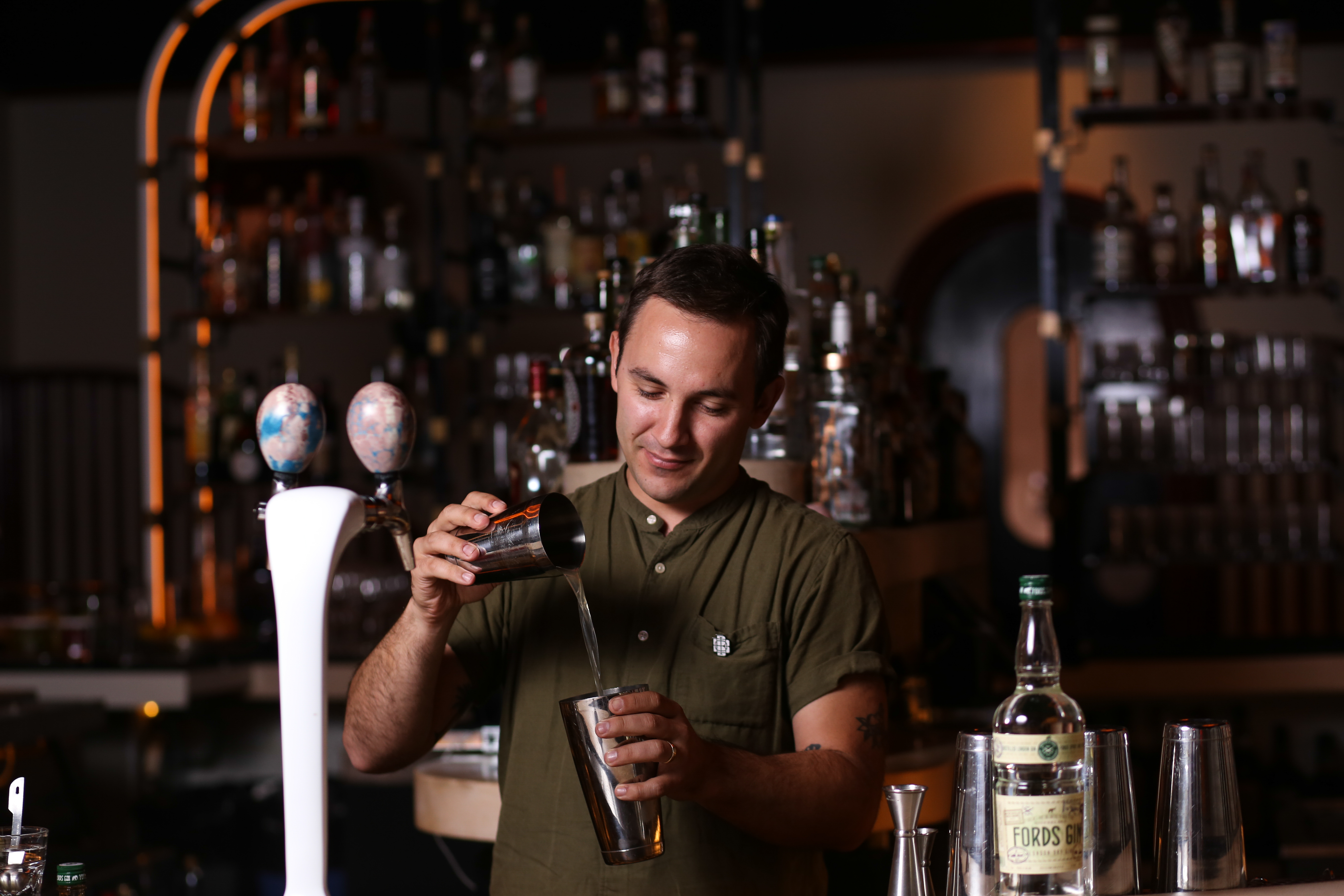
Daniel Zacharczuk at Bibo Ergo Sum | Photo: Eugene Lee
A deep dive into Zacharczuk’s extensive resume connects him to a dizzying number of L.A. bartenders, not unlike a bar industry version of Kevin Bacon.
Zacharczuk began his hospitality career the same way as many craft bartenders – at TGI Fridays. A native of Yorba Linda in Orange County, Zacharczuk started at TGI Fridays in 2005 and eventually worked as host, cook, and bartender. Key bars started opening in L.A. around that time, including Seven Grand, Rivera, The Varnish, and Copa d’Oro. “We made our way to The Varnish eventually, and just did the same thing that I would do as a barback at TGI Fridays – sit and watch, ask questions – lather, rinse repeat.”
The Varnish staff pointed him in the right direction. He met Joe Keeper, who owns Bar Keeper in Silver Lake, and was invited to a monthly gathering of the L.A. bar community called Sporting Life. On a “very serendipitous day,” Zacharczuk was about to leave for the Sporting Life holiday party at Musso & Frank Grill and got a flat tire. It was “dumping rain,” but he decided to change the tire and drove from Fullerton to Hollywood. “Met a bunch of people who – if they haven’t stayed in L.A. to work, they’ve moved on to bigger and better things.”
Flash forward to the next day after Sporting Life, and everyone at the Playa training at Rivera was hungover. Everyone except for Daniel, who was too “terrified” about making a good impression to party at Musso’s. Playa opened on Beverly Boulevard in January 2011 and Zacharczuk was there till July. (Playa became Petty Cash Taqueria in May 2013.)
“At that time there was a lot of emphasis put onto knowing your cocktails, being able to serve them in a timely manner, and knowing the cocktail history. I feel like there was a big change – that’s not better or worse by any means, it’s just interesting how it’s evolved in that time, in only 7 or 8 years. Knowing your drinks is a given – now you have to know how to take care of people while making the drinks, and to me that’s really exciting.”
He continues, “I don’t want to use the word ‘juggle’ – the idea of giving true hospitality while you’re working on a round of however many drinks – it shouldn’t be a big accomplishment, it should feel natural. You shouldn’t have to tell someone, ‘Give me one second, I’m working on this.’ You should ask them questions, engage with them. This should be natural. That took me a long time to really get down right – it’s not an easy thing to do but it’s incredibly rewarding. You take your home bar with you wherever you go when you get that approach to hospitality down.”
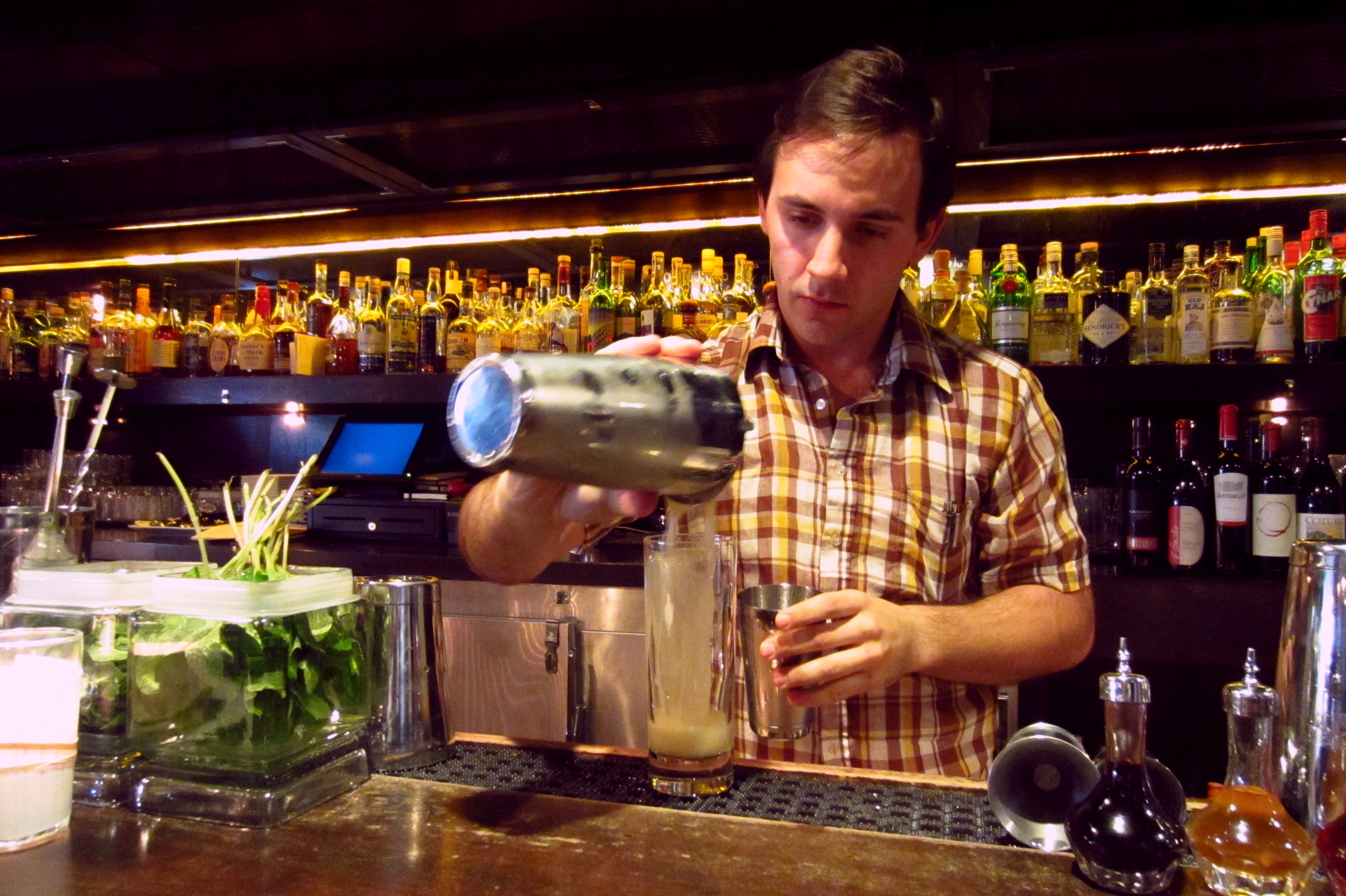
Devon Tarby was working at The Varnish and told him there was a job opening for a barback at Bar | Kitchen at the O Hotel, which was Proprietors LLC‘s first L.A. project. “I got to dive further down the rabbit hole – going through the Julian Cox program, going through the Proprietors program. I really enjoyed the camaraderie, the atmosphere, the focus to detail, but also the relaxed atmosphere that we had to offer there. It’s like your first partner – it’s a strange, intoxicating but at the same time sobering experience.” Zacharczuk started working at B|K not long after Playa opened. Then came an opportunity at The Varnish.
https://www.instagram.com/p/BCMyjf9Cvrv/
Zacharczuk says his interview with Varnish partner Eric Alperin and then-bar manager Chris Bostick was more like a conversation. “They were very no-BS, cut to the chase, let’s talk about business.” At any rate, he got the gig. “One of the servers at Bar | Kitchen ended up training me to work the floor at The Varnish. At that time I was the head bartender at Bar | Kitchen – it’s funny to be one person’s boss and be trained by them at the next spot. To me, that was a big ego check. It’s not about where you work, where you’re from, what you know. Everyone starts at the same level at this particular bar, that’s how it is, and it’s not a big deal.”
For the next year and a half, Zacharczuk worked at Bar | Kitchen and The Varnish. “It was a really fun time. I was starting a long distance relationship with Tiffany [his wife, who lived in Toronto at the time]. A lot of traveling, a lot of working.”
Zacharczuk shares a story about the time he and his brother Nick went to The Varnish when they both had a night off. “Nick said, ‘I’ve never seen you like this, where you’ve given yourself to your job so much that it shows that you’re part of the bar, and the bar is part of you.’ And I never thought of it that way. And he said, ‘Not that it’s a bad thing at all, it’s not like you have an addiction to your work.’ It’s interesting to see that you’re part of something when you’re not there and see how it comes through – it’s right below the surface sometimes, when you go to a bar like The NoMad – this wonderful, beautiful space.
“When you learn as much as you learn at any given venue, it stays with you and you look at certain things – the garnish should go here, they’re doing it the same way we do it there, that’s amazing. Those details carry through and they stay with you. So it was nice to see that my family, specifically my brother was saying that it had a positive impact on me. To be part of something but that something is also part of me now, kind of a testament [that] you are your experiences.”
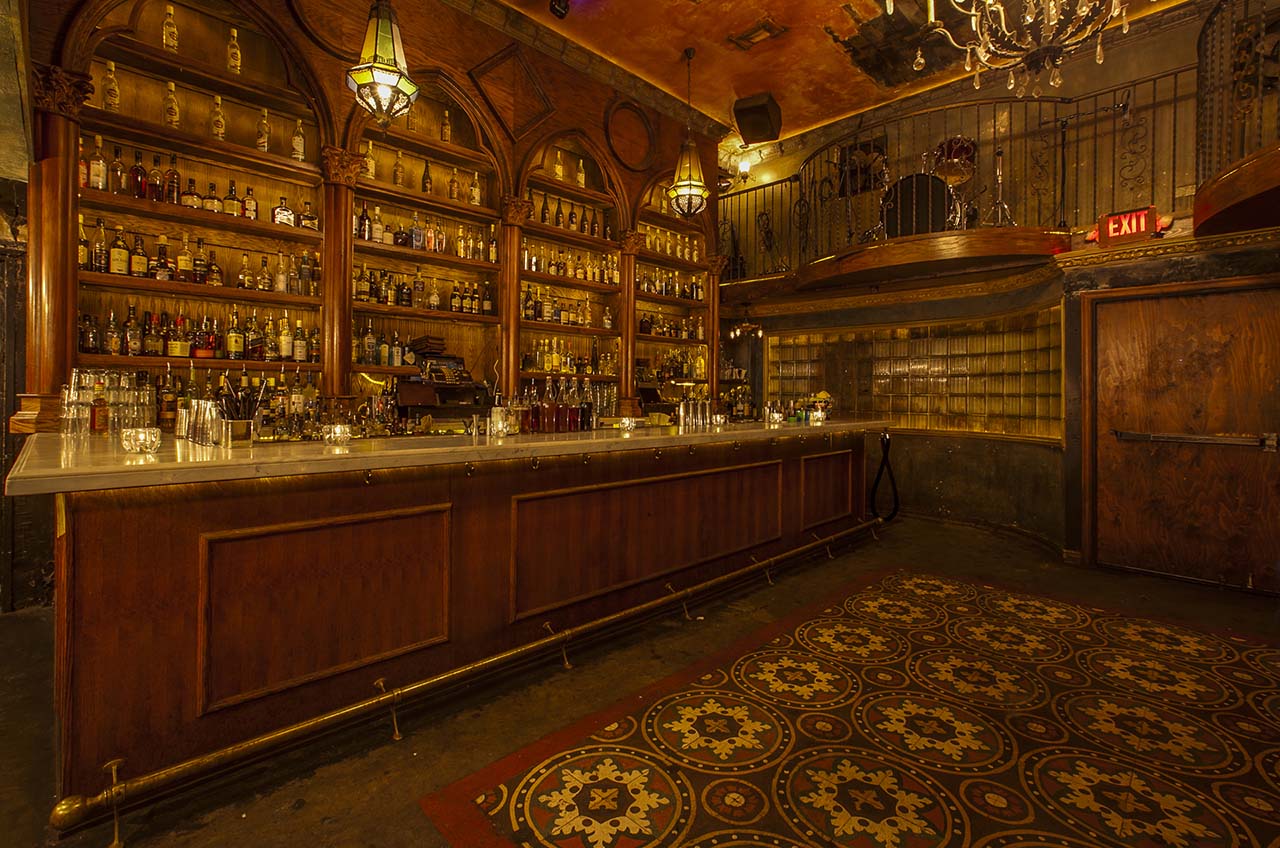
La Descarga | Photo: Houston Hospitality
His good friend from Bar | Kitchen, Joseph Swifka had left B|K to manage La Descarga and asked Zacharczuk if he was interested in working there too. “I’m definitely interested because I never really worked in a high volume spot before and I want to know what that’s like, I want to learn from that. And then Julian was in touch because he was staffing for [the opening of] Bestia.”
“I think the idea of hospitality, there are certain tiers to it in regards to what kind of opportunity you have to have and experience. A restaurant is one of the ultimate places. To me, a hotel bar is the ultimate hospitality experience you could have. A restaurant is not far off. And I like opening spots. I didn’t know that about myself, but I like opening spots. That might seem masochistic, but I don’t care.”
So now Zacharczuk was working at The Varnish, La Descarga, and Bestia. “I was training at La Descarga, and helping open and training at Bestia as well. After three months of working at all three jobs, I needed to decide because I was just burning myself out.”
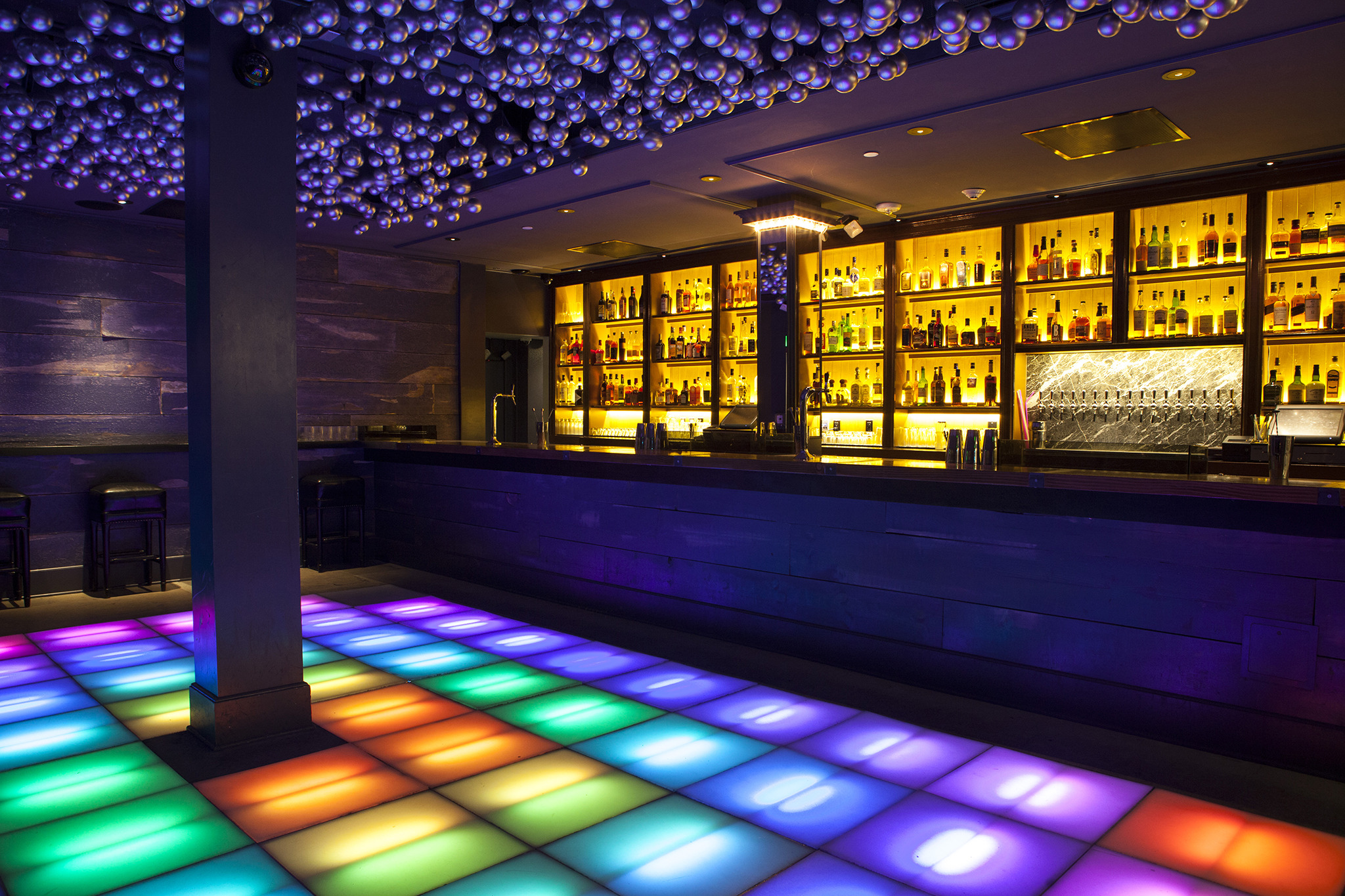
Since he had worked at restaurants before, Zacharczuk decided to leave Bestia and worked at The Varnish and La Descarga full time. He did that for about a year until he gave notice at La Descarga to join the opening team at Honeycut, which recently ended its five-year run. The first collaboration between 213 Hospitality and Proprietors LLC, Honeycut featured an all-star crew that included Mary Bartlett, Matt Brown, Chris Day, Daniel Eun, Dave Fernie, Serena Herrick, Chris Gomez, Justin Graham, Nick Griffith, Josh Lucas, Harry May-Kline, Shakir Najieb, Eva Pelczer, Nick Settle, Ria Soler, Estiven Orozco Torres, and Anna Trumbo.
“I’m not sure if ‘behemoth’ is enough of a word to describe what it was like to open that place, but it was certainly that. And it was a lot of fun. It was a lot of dexterity training for the cocktail bar. There was the disco bar that was really more [about] speed.”
The opening GM at Honeycut was Adam Weisblatt (Last Word Hospitality), who was previously the GM at Bar | Kitchen. Zacharczuk says, “There’s something to be said about when you hire the right people at the right time for the right gig. And we did that for Honeycut. That was a really special team, we had a lot of fun together. All the things that could go wrong – a subterranean bar with no windows underneath a hotel, the owner who hates the place from Day One – all the things that could go wrong went wrong. You couldn’t have had a better crew to be surrounded by to keep your head on straight. Know when to make the right call, and know when not to say anything.”
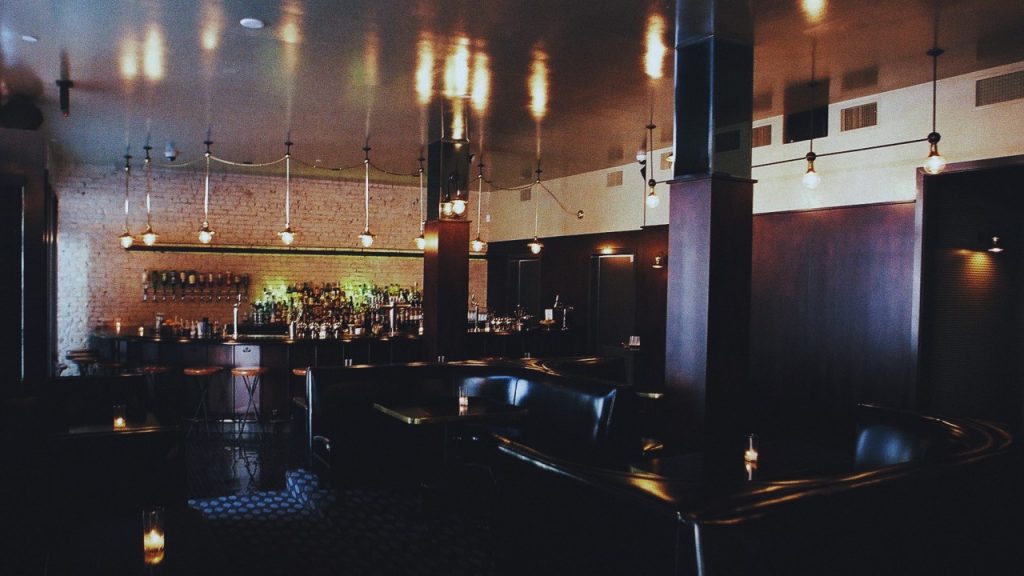
In 2015, he left Honeycut to help open another 213/Proprietors project, Normandie Club in Koreatown. Zacharczuk was excited because he saw Normandie as a hotel bar, plus it was conveniently located a five-minute walk from his apartment at The Gaylord on Wilshire. “It was with all the people and the ethos that I knew, appreciated and enjoyed working at a place of hospitality.” A few months later, The Walker Inn opened in the back of Normandie Club.
“The setup of that particular venue is unique because it shares a back of house, which doesn’t really happen. But it works. That dishwasher pit keeps anybody warm on a cold night. That was a really exciting experience for a number of reasons. I think the biggest one is that we were able to offer guests an experience that was pretty unique, and we were getting a lot of positive attention for [it]. It was like a white cube for artists in a gallery space, we were able to paint whatever picture we wanted to paint.”
After a brief stint to open the second location of Salt’s Cure, Zacharczuk was pulling shifts at The Varnish, bartending at Walker Inn, and started working private events. By this time he had married Tiffany, and after Daniel came “super close” to moving to Toronto, they moved to Silver Lake. In the summer of 2016, he briefly returned to Bestia when Last Word revamped the cocktail program and helped launch Bavel with another B|K alum, Ricky Yarnall at the helm.
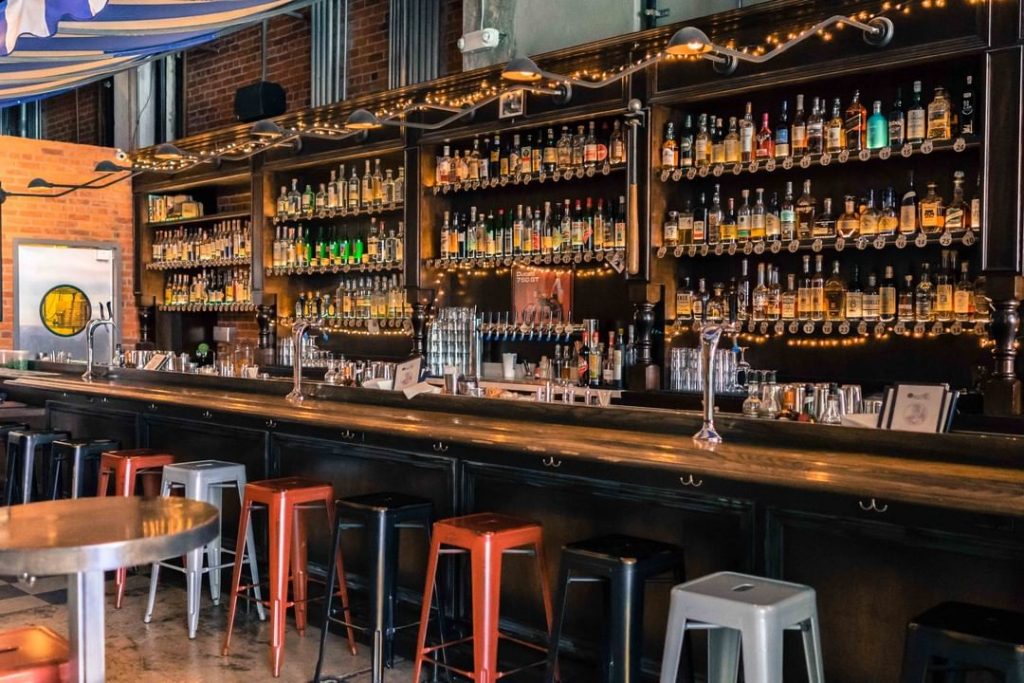
Alperin reached out and said that he and Richie Boccato were opening Bar Clacson on Broadway with Dustin Newsome as Bar Manager. “Again, it’s a fairly intoxicating mindset to be in when you work with someone for four-plus years – or however long – and you see eye-to-eye on a lot of things, or you agree with how certain justifications are made, or just the mindset of hospitality being a noble vocation.”
Zacharczuk describes their interview process as “fascinating.” (“If you had $500 how would you spend it?” “What are your top five favorite records?”) “I found it really refreshing and kind of different, to be asked personal questions at essentially a hiring interview. Because you’re hiring the person. You can train anybody to make a drink. As delicious as drinks are and how much time gets put into them, anyone can make a drink. Like in Ratatouille, ‘anyone can cook’ and I really appreciated that.”
“The training process when we opened Bar Clacson – it took a lot of elbow grease but it was a lot of fun. I was lucky enough that Eric, Richie and Dustin basically asked me to help train the staff – and I did to how I thought – if it were my bar, how I would train them.”
“It was a lot of role-playing, a lot of repetition, being on time. Role-playing was the trickiest part because you would have someone make two classic style drinks like a collins and a Manhattan. You’d whisper in someone’s ear across the bar: ‘Hey, in 30 seconds I want you to start inching your way behind the bar and just get in their way. And let’s see what they do. Let’s just see what happens.’ During that process, the bartender who was making the round is kind of like, ‘What are you doing? I’m working here.’ So they would look at me, ‘Is this OK?’ Just keep doing what you’re doing, we’ll talk about it later.”
“It was really rewarding, because towards the end of training you’d have this group of people who had never met before, never worked in the same bar together, who probably never worked in hospitality before – now [they] know how to gracefully shoo people away from them while they’re building a round of drinks and still carry a conversation.”
“It’s exciting to know that trainings for bar openings have gone from knowing the difference between a fix, a fizz, a collins, and a sour to – yeah, we know those things. What’s the next thing you’re going to work towards, and that’s obviously your guests and the community at large.”
Then he got a phone call from Tarby about a new Proprietors project in West Hollywood, Bibo Ergo Sum. They needed a GM and thought he’d be a good fit. The next day he had a phone interview with Bibo owner Tait Forman. They clicked, he was on board and working at Bibo by the end of October 2017.
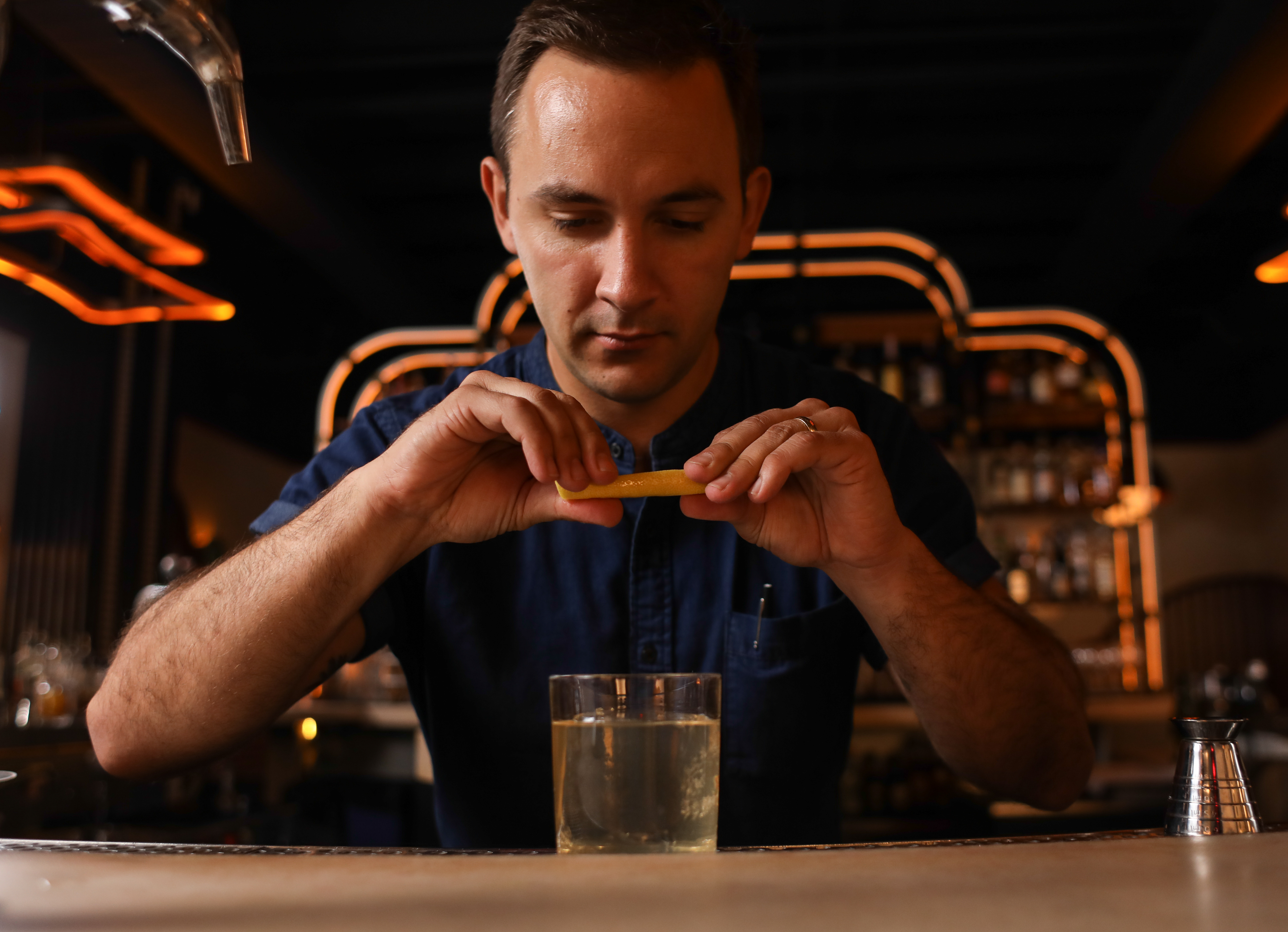
Daniel Zacharczuk at Bibo Ergo Sum | Photo: Eugene Lee
The opening menu was inspired by The Prestige (2006) and based on the three steps of a magic trick: The Pledge, The Turn, and The Prestige. The concept was already in place when he was hired. “Devon asked, ‘Do you want to collaborate? You don’t have to if you don’t want to, I know there’s a lot involved with opening a spot as a GM. If you want to collaborate, you can.’
Zacharczuk continues, “I think it’s important that any opening manager of any spot has – if not feedback, then a hand in the development of what the offerings are going to look like. A lot of the drinks are solely hers, a handful of drinks are mine, and a small handful we bounced ideas back and forth, and it worked out.”
“A big part of the hiring process for me was taking that experience when I got hired at Bar Clacson and also applying certain employer-specific questions of how long have you done this for – to give myself some context as to what do I need to know about this person outside of their awesome personality that I can justify putting them at XYZ position at the bar.”
Two days before opening, Zacharczuk still had three barback spots to fill. “I was able to reach out to friends. ‘Hey, this person doesn’t have enough experience to serve, but they’re young enough and hungry enough that they would like to barback.’ And they’re still there today. It’s been over a year and if they’re not still barbacking then they’ve worked their way up to bartender. And that’s been a very valuable method to help evolve your culture is to promote from within. I remember applying at Seven Grand and basically getting laughed out the door. ‘I bartend at TGI Fridays!’ ‘No one cares. We promote from within, thanks. You can leave your resume IF you want.’ [laughs]
“Hiring for Bibo, a lot of it had to do with ‘You know the bar is here. Do you live in the area. And if you don’t live in the area are you ok with commuting here.’ Which is definitely not the first question you would ask someone to lead them on that they’re going to get the job or not.
“But it’s an important one. I find great value in being part of the community wherever you are working. We’ve hired people who have bartended before, who have a lot of experience out of New York, some experience in L.A., to no experience at all – they are just impassioned by the hospitality idea. You can’t coach hustle, you can’t really introduce someone to be impassioned about something. You either are or you’re not, and you either know it or don’t know it yet.”

[…] menu was a collaboration between Devon Tarby of Proprietors and Bibo’s GM, Daniel Zacharczuk. Forman says, “I have no expertise in creating drinks, so I will take no credit for that. But […]